Fleurs du Mal Magazine


Or see the index
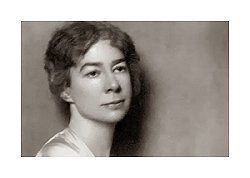
Sara Teasdale
(1884 – 1933)
There Will Come Soft Rains
There will come soft rains and the smell of the ground,
And swallows circling with their shimmering sound;
And frogs in the pools, singing at night,
And wild plum trees in tremulous white,
Robins will wear their feathery fire,
Whistling their whims on a low fence-wire;
And not one will know of the war, not one
Will care at last when it is done.
Not one would mind, neither bird nor tree,
If mankind perished utterly;
And Spring herself, when she woke at dawn,
Would scarcely know that we were gone.
Sara Teasdale poetry
fleursdumal.nl magazine
More in: Archive S-T, Teasdale, Sara
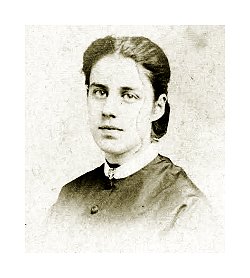
Emma Lazarus
(1849 – 1887)
HEROES
In rich Virginian woods,
The scarlet creeper reddens over graves,
Among the solemn trees enlooped with vines;
Heroic spirits haunt the solitudes,–
The noble souls of half a million braves,
Amid the murmurous pines.
Ah! who is left behind,
Earnest and eloquent, sincere and strong,
To consecrate their memories with words
Not all unmeet? with fitting dirge and song
To chant a requiem purer than the wind,
And sweeter than the birds?
Here, though all seems at peace,
The placid, measureless sky serenely fair,
The laughter of the breeze among the leaves,
The bars of sunlight slanting through the trees,
The reckless wild-flowers blooming everywhere,
The grasses’ delicate sheaves,–
Nathless each breeze that blows,
Each tree that trembles to its leafy head
With nervous life, revives within our mind,
Tender as flowers of May, the thoughts of those
Who lie beneath the living beauty, dead,–
Beneath the sunshine, blind.
For brave dead soldiers, these:
Blessings and tears of aching thankfulness,
Soft flowers for the graves in wreaths enwove,
The odorous lilac of dear memories,
The heroic blossoms of the wilderness,
And the rich rose of love.
But who has sung their praise,
Not less illustrious, who are living yet?
Armies of heroes, satisfied to pass
Calmly, serenely from the whole world’s gaze,
And cheerfully accept, without regret,
Their old life as it was,
With all its petty pain,
Its irritating littleness and care;
They who have scaled the mountain, with content
Sublime, descend to live upon the plain;
Steadfast as though they breathed the mountain-air
Still, wheresoe’er they went.
They who were brave to act,
And rich enough their action to forget;
Who, having filled their day with chivalry,
Withdraw and keep their simpleness intact,
And all unconscious add more lustre yet
Unto their victory.
On the broad Western plains
Their patriarchal life they live anew;
Hunters as mighty as the men of old,
Or harvesting the plenteous, yellow grains,
Gathering ripe vintage of dusk bunches blue,
Or working mines of gold;
Or toiling in the town,
Armed against hindrance, weariness, defeat,
With dauntless purpose not to serve or yield,
And calm, defiant, they struggle on,
As sturdy and as valiant in the street,
As in the camp and field.
And those condemned to live,
Maimed, helpless, lingering still through suffering years,
May they not envy now the restful sleep
Of the dear fellow-martyrs they survive?
Not o’er the dead, but over these, your tears,
O brothers, ye may weep!
New England fields I see,
The lovely, cultured landscape, waving grain,
Wide haughty rivers, and pale, English skies.
And lo! a farmer ploughing busily,
Who lifts a swart face, looks upon the plain,–
I see, in his frank eyes,
The hero’s soul appear.
Thus in the common fields and streets they stand;
The light that on the past and distant gleams,
They cast upon the present and the near,
With antique virtues from some mystic land,
Of knightly deeds and dreams.
Emma Lazarus poetry
fleursdumal.nl magazine
More in: Archive K-L, Lazarus, Emma
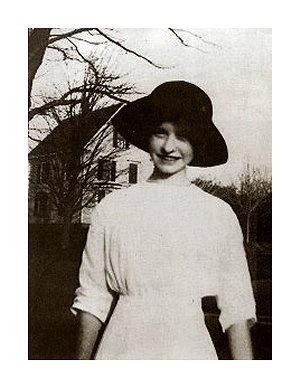
Eunice Tietjens
(1884 – 1944)
On the Canton River Boat
Up and down, up and down, paces the sentry.
He is dressed in a uniform of khaki and his socks are
green. Over his shoulder is slung a rifle, and
from his belt hang a pistol and cartridge pouch.
He is, I think, Malay and Chinese mixed.
Behind him the rocky islands, hazed in blue, the yellow
sun-drenched water, the tropic shore, pass as a
background in a dream.
He only is sweltering reality.
Yet he is here to guard against a nightmare, an
anachronism, something that I cannot grasp.
He is guarding me from pirates.
Piracy! The very name is fantastic in my ears, colored
like a toucan in the zoo.
And yet the ordinance is clear: “Four armed guards,
strong metal grills behind the bridge, the engine-room
enclosed–in case of piracy.”
The socks of the sentry are green.
Up and down, up and down he paces, between the
bridge and the first of the life-boats.
In my deck chair I grow restless.
Am I then so far removed from life, so wrapped in
cotton wool, so deep-sunk in the soft lap of civilization,
that I cannot feel the cold splash of truth?
It is a disquieting thought–for certainly piracy seems
as fantastic as ever.
The socks of the sentry annoy me. They are _too_
green for so hot a day.
And his shoes squeak.
I should feel much cooler if he wouldn’t pace so.
Piracy!
(Somewhere on the River)
Eunice Tietjens poetry
fleursdumal.nl magazine
More in: Archive S-T, Tietjens, Eunice
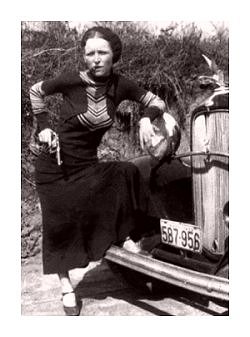
Bonnie Elizabeth Parker
(1910 – 1934)
The trail’s end
You’ve read the story of Jesse James
of how he lived and died.
If you’re still in need;
of something to read,
here’s the story of Bonnie and Clyde.
Now Bonnie and Clyde are the Barrow gang
I’m sure you all have read.
how they rob and steal;
and those who squeal,
are usually found dying or dead.
There’s lots of untruths to these write-ups;
they’re not as ruthless as that.
their nature is raw;
they hate all the law,
the stool pigeons, spotters and rats.
They call them cold-blooded killers
they say they are heartless and mean.
But I say this with pride
that I once knew Clyde,
when he was honest and upright and clean.
But the law fooled around;
kept taking him down,
and locking him up in a cell.
Till he said to me;
“I’ll never be free,
so I’ll meet a few of them in hell”
The road was so dimly lighted
there were no highway signs to guide.
But they made up their minds;
if all roads were blind,
they wouldn’t give up till they died.
The road gets dimmer and dimmer
sometimes you can hardly see.
But it’s fight man to man
and do all you can,
for they know they can never be free.
From heart-break some people have suffered
from weariness some people have died.
But take it all in all;
our troubles are small,
till we get like Bonnie and Clyde.
If a policeman is killed in Dallas
and they have no clue or guide.
If they can’t find a fiend,
they just wipe their slate clean
and hang it on Bonnie and Clyde.
There’s two crimes committed in America
not accredited to the Barrow mob.
They had no hand;
in the kidnap demand,
nor the Kansas City Depot job.
A newsboy once said to his buddy;
“I wish old Clyde would get jumped.
In these awfull hard times;
we’d make a few dimes,
if five or six cops would get bumped”
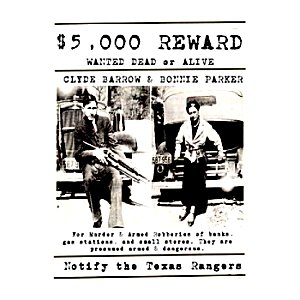
The police haven’t got the report yet
but Clyde called me up today.
He said,”Don’t start any fights;
we aren’t working nights,
we’re joining the NRA.”
From Irving to West Dallas viaduct
is known as the Great Divide.
Where the women are kin;
and the men are men,
and they won’t “stool” on Bonnie and Clyde.
If they try to act like citizens
and rent them a nice little flat.
About the third night;
they’re invited to fight,
by a sub-gun’s rat-tat-tat.
They don’t think they’re too smart or desperate
they know that the law always wins.
They’ve been shot at before;
but they do not ignore,
that death is the wages of sin.
Some day they’ll go down together
they’ll bury them side by side.
To few it’ll be grief,
to the law a relief
but it’s death for Bonnie and Clyde.
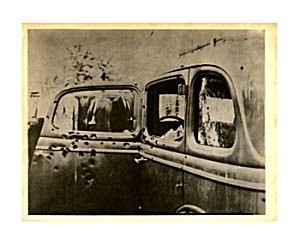
A few weeks before Bonny Parker was killed by 26 bullets from the police, she wrote this poem which she sent to her mother.
Bonnie Parker poetry
• fleursdumal.nl magazine
More in: #Editors Choice Archiv, Archive O-P, Archive O-P, Bonnie and Clyde, Bonnie Parker, CRIME & PUNISHMENT, Western Fiction
The Sorrows of Young Werther (24) by J.W. von Goethe ♦ JULY 30. 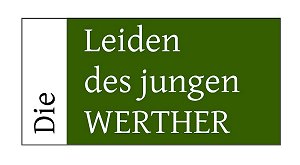 Albert is arrived, and I must take my departure. Were he the best and noblest of men, and I in every respect his inferior, I could not endure to see him in possession of such a perfect being. Possession!–enough, Wilhelm: her betrothed is here,–a fine, worthy fellow, whom one cannot help liking. Fortunately I was not present at their meeting. It would have broken my heart! And he is so considerate: he has not given Charlotte one kiss in my presence. Heaven reward him for it! I must love him for the respect with which he treats her. He shows a regard for me, but for this I suspect I am more indebted to Charlotte than to his own fancy for me. Women have a delicate tact in such matters, and it should be so. They cannot always succeed in keeping two rivals on terms with each other; but, when they do, they are the only gainers.
Albert is arrived, and I must take my departure. Were he the best and noblest of men, and I in every respect his inferior, I could not endure to see him in possession of such a perfect being. Possession!–enough, Wilhelm: her betrothed is here,–a fine, worthy fellow, whom one cannot help liking. Fortunately I was not present at their meeting. It would have broken my heart! And he is so considerate: he has not given Charlotte one kiss in my presence. Heaven reward him for it! I must love him for the respect with which he treats her. He shows a regard for me, but for this I suspect I am more indebted to Charlotte than to his own fancy for me. Women have a delicate tact in such matters, and it should be so. They cannot always succeed in keeping two rivals on terms with each other; but, when they do, they are the only gainers.
I cannot help esteeming Albert. The coolness of his temper contrasts strongly with the impetuosity of mine, which I cannot conceal. He has a great deal of feeling, and is fully sensible of the treasure he possesses in Charlotte. He is free from ill-humour, which you know is the fault I detest most.
He regards me as a man of sense; and my attachment to Charlotte, and the interest I take in all that concerns her, augment his triumph and his love. I shall not inquire whether he may not at times tease her with some little jealousies; as I know, that, were I in his place, I should not be entirely free from such sensations.
But, be that as it may, my pleasure with Charlotte is over. 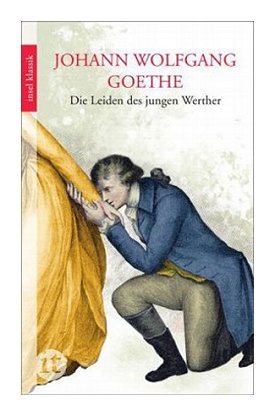 Call it folly or infatuation, what signifies a name? The thing speaks for itself. Before Albert came, I knew all that I know now. I knew I could make no pretensions to her, nor did I offer any, that is, as far as it was possible, in the presence of so much loveliness, not to pant for its enjoyment. And now, behold me like a silly fellow, staring with astonishment when another comes in, and deprives me of my love.
Call it folly or infatuation, what signifies a name? The thing speaks for itself. Before Albert came, I knew all that I know now. I knew I could make no pretensions to her, nor did I offer any, that is, as far as it was possible, in the presence of so much loveliness, not to pant for its enjoyment. And now, behold me like a silly fellow, staring with astonishment when another comes in, and deprives me of my love.
I bite my lips, and feel infinite scorn for those who tell me to be resigned, because there is no help for it. Let me escape from the yoke of such silly subterfuges! I ramble through the woods; and when I return to Charlotte, and find Albert sitting by her side in the summer-house in the garden, I am unable to bear it, behave like a fool, and commit a thousand extravagances. “For Heaven’s sake,” said Charlotte today, “let us have no more scenes like those of last night! You terrify me when you are so violent.” Between ourselves, I am always away now when he visits her: and I feel delighted when I find her alone.
The Sorrows of Young Werther (Die Leiden des jungen Werther) by J.W. von Goethe. Translated by R.D. Boylan.
To be continued
fleursdumal.nl magazine for art & literature
More in: -Die Leiden des jungen Werther, Goethe, Johann Wolfgang von
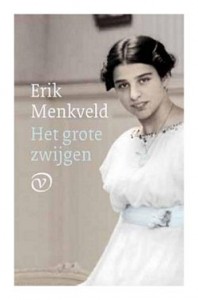 Schrijver en dichter Erik Menkveld (1959 – 2014) overleden
Schrijver en dichter Erik Menkveld (1959 – 2014) overleden
Op zondag 30 maart is dichter en romancier Erik Menkveld overleden. De in 1959 in Eindhoven geboren Menkveld studeerde Nederlands in Amsterdam en werkte na zijn studie tot 1998 voor De Bezige Bij en aansluitend voor Poetry International.
Sinds 2002 besteedde hij zijn tijd voornamelijk aan het schrijven van poëzie en proza, de laatste jaren combineerde hij dat met literatuurlessen op een lyceum. Ook was hij poëziecriticus voor de Volkskrant.
Erik Menkveld wordt vrijdag aanstaande om 13.00 uur begraven op Zorgvlied. Hij laat een vrouw en drie kinderen na.
Beknopte bibliografie:
Gedichten
Koebeest en vrouwdier, 1995 [Bibliofiele uitgave]
Lente, 1997 [Bibliofiele uitgave]
De Karpersimulator, Amsterdam: De Bezige Bij, 1997.
Schapen nu!: gedichten, Amsterdam: De Bezige Bij, 2001.
Prime time, Amsterdam: Van Oorschot, 2005.
Een prachtige dag, Terhorst: Ser J.L. Prop. 2006 [Bibliofiele uitgave.]
Andere publicaties
Briefwisseling met R. N. Roland Holst en H. Roland Holst-van der Schalk / A. Roland Holst ; uitg. met inl. en aant. door Erik Menkveld en Margaretha H. Schenkeveld, Amsterdam: De Arbeiderspers, 1990.
Honderd jaar Nobelprijspoëzie / samenst. en inl. Erik Menkveld, Amsterdam: Meulenhoff, 2000 [Bloemlezing.]
De beste Nobelprijspoëzie / samenst. en inl. Erik Menkveld, Amsterdam: Pockethuis, 2002. [Bloemlezing.]
Met de meeste hoogachting / Erik Menkveld, Amsterdam: Van Oorschot, 2006 (Brieven)
Het grote zwijgen / Erik Menkveld, Amsterdam: Van Oorschot, 2011 (Roman)
fleursdumal.nl magazine
More in: Archive M-N, In Memoriam, Menkveld, Erik
 The Sorrows of Young Werther (23) by J.W. von Goethe ♦ JULY 25. Yes, dear Charlotte! I will order and arrange everything. Only give me more commissions, the more the better. One thing, however, I must request: use no more writing-sand with the dear notes you send me. Today I raised your letter hastily to my lips, and it set my teeth on edge.
The Sorrows of Young Werther (23) by J.W. von Goethe ♦ JULY 25. Yes, dear Charlotte! I will order and arrange everything. Only give me more commissions, the more the better. One thing, however, I must request: use no more writing-sand with the dear notes you send me. Today I raised your letter hastily to my lips, and it set my teeth on edge.
JULY 26. I have often determined not to see her so frequently. But who could keep such a resolution? Every day I am exposed to the temptation, and promise faithfully that to-morrow I will really stay away: but, when tomorrow comes, I find some irresistible reason for seeing her; and, before I can account for it, I am with her again. Either she has said on the previous evening “You will be sure to call to-morrow,”–and who could stay away then?–or she gives me some commission, and I find it essential to take her the answer in person; or the day is fine, and I walk to Walheim; and, when I am there, it is only half a league farther to her. I am within the charmed atmosphere, and soon find myself at her side. My grandmother used to tell us a story of a mountain of loadstone. When any vessels came near it, they were instantly deprived of their ironwork: the nails flew to the mountain, and the unhappy crew perished amidst the disjointed planks.
The Sorrows of Young Werther (Die Leiden des jungen Werther) by J.W. von Goethe. Translated by R.D. Boylan.
To be continued
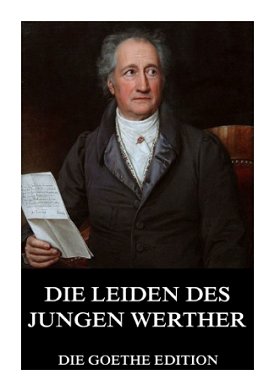
fleursdumal.nl
More in: -Die Leiden des jungen Werther, Goethe, Johann Wolfgang von
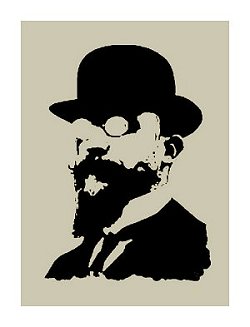
Erik Satie
(1866 – 1925)
La Comédie italienne
À la napolitaine
Scaramouche explique les beautés de l’état militaire.
On y est fortement malin, dit-il.
On fait peur aux civils.
Et les galantes aventures !
Et le reste !
Quel beau métier !
29 avril 1914
Erik Satie La Comédie italienne
fleursdumal.nl magazine
More in: Archive S-T, Erik Satie, Satie, Erik
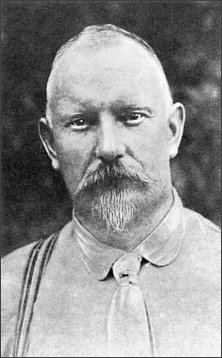
Jules Renard
(1864-1910)
Ne réservez pas à ma vieillesse un château
… Ne réservez pas à ma vieillesse un château, mais faites-
moi la grâce de me garder, comme dernier refuge, cette cuisine
avec sa marmite toujours en l’air,
avec la crémaillère aux dents diaboliques,
la lanterne d’écurie et le moulin à café,
le litre de pétrole, la boîte de chicorée extra et les allumettes
de contrebande,
avec la lune en papier jaune qui bouche le trou du tuyau de poêle,
et les coquilles d’oeufs dans la cendre,
et les chenets au front luisant, au nez aplati,
et le soufflet qui écarte ses jambes raides et dont le ventre fait
de gros plis,
avec ce chien à droite et ce chat à gauche de la cheminée,
tous deux vivants peut-être,
et le fourneau d’où filent des étoiles de braise,
et la porte au coin rongé par les souris,
et la passoire grêlée, la bouillotte bavarde et le grill haut sur
pattes comme un basset,
et le carreau cassé de l’unique fenêtre dont la vue se paierait cher
à Paris,
et ces pavés de savon,
et cette chaise de paille honnêtement percée,
et ce balai inusable d’un côté,
et cette demi-douzaine de fers à repasser, à genoux sur leur planche,
par rang de taille, comme des religieuses qui prient, voilées de noir
et les mains jointes.
jules renard poésie
fleursdumal.nl magazine
More in: Archive Q-R, CLASSIC POETRY
 The Sorrows of Young Werther (22) by J.W. von Goethe ♦ JULY 20. I cannot assent to your proposal that I should accompany the ambassador to ——. I do not love subordination; and we all know that he is a rough, disagreeable person to be connected with. You say my mother wishes me to be employed. I could not help laughing at that. Am I not sufficiently employed? And is it not in reality the same, whether I shell peas or count lentils? The world runs on from one folly to another; and the man who, solely from regard to the opinion of others, and without any wish or necessity of his own, toils after gold, honour, or any other phantom, is no better than a fool.
The Sorrows of Young Werther (22) by J.W. von Goethe ♦ JULY 20. I cannot assent to your proposal that I should accompany the ambassador to ——. I do not love subordination; and we all know that he is a rough, disagreeable person to be connected with. You say my mother wishes me to be employed. I could not help laughing at that. Am I not sufficiently employed? And is it not in reality the same, whether I shell peas or count lentils? The world runs on from one folly to another; and the man who, solely from regard to the opinion of others, and without any wish or necessity of his own, toils after gold, honour, or any other phantom, is no better than a fool.
JULY 24. You insist so much on my not neglecting my drawing, that it would be as well for me to say nothing as to confess how little I have lately done.
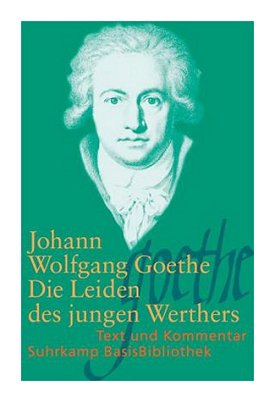 I never felt happier, I never understood nature better, even down to the veriest stem or smallest blade of grass; and yet I am unable to express myself: my powers of execution are so weak, everything seems to swim and float before me, so that I cannot make a clear, bold outline. But I fancy I should succeed better if I had some clay or wax to model. I shall try, if this state of mind continues much longer, and will take to modelling, if I only knead dough.
I never felt happier, I never understood nature better, even down to the veriest stem or smallest blade of grass; and yet I am unable to express myself: my powers of execution are so weak, everything seems to swim and float before me, so that I cannot make a clear, bold outline. But I fancy I should succeed better if I had some clay or wax to model. I shall try, if this state of mind continues much longer, and will take to modelling, if I only knead dough.
I have commenced Charlotte’s portrait three times, and have as often disgraced myself. This is the more annoying, as I was formerly very happy in taking likenesses. I have since sketched her profile, and must content myself with that.
The Sorrows of Young Werther (Die Leiden des jungen Werther) by J.W. von Goethe. Translated by R.D. Boylan.
To be continued
fleursdumal.nl magazine for art & literature
More in: -Die Leiden des jungen Werther, Goethe, Johann Wolfgang von
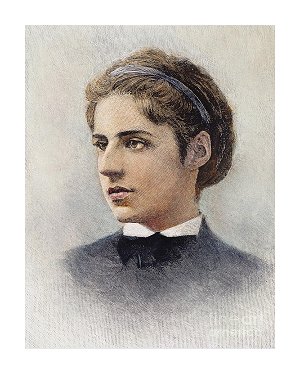
Emma Lazarus
(1849 – 1887)
Youth
Sweet empty sky of June without a stain,
Faint, gray-blue dewy mists on far-off hills,
Warm, yellow sunlight flooding mead and plain,
That each dark copse and hollow overfills;
The rippling laugh of unseen, rain-fed rills,
Weeds delicate-flowered, white and pink and gold,
A murmur and a singing manifold.
The gray, austere old earth renews her youth
With dew-lines, sunshine, gossamer, and haze.
How still she lies and dreams, and veils the truth,
While all is fresh as in the early days!
What simple things be these the soul to raise
To bounding joy, and make young pulses beat,
With nameless pleasure finding life so sweet.
On such a golden morning forth there floats,
Between the soft earth and the softer sky,
In the warm air adust with glistening motes,
The mystic winged and flickering butterfly,
A human soul, that hovers giddily
Among the gardens of earth’s paradise,
Nor dreams of fairer fields or loftier skies.
Emma Lazarus poetry
fleursdumal.nl magazine
More in: Archive K-L, Lazarus, Emma
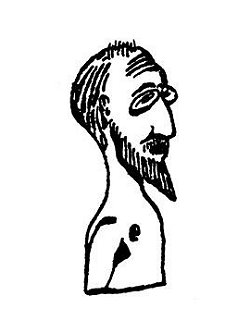
Erik Satie
(1866 – 1925)
Le Tango
Le tango est la danse du diable.
C’est celle qu’il préfère.
Il la danse pour se refroidir.
Sa femme, ses filles et ses domestiques se refroidissent.
5 mai 1914
Erik Satie Le Tango
fleursdumal.nl magazine
More in: Archive S-T, DANCE & PERFORMANCE, Erik Satie, Satie, Erik
Thank you for reading Fleurs du Mal - magazine for art & literature